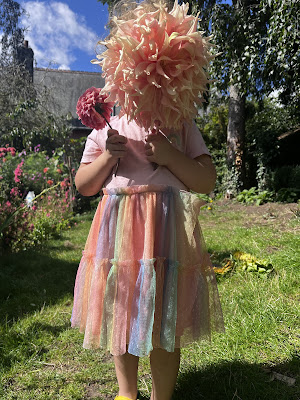- an array of different types of tulips
- Alliums,
- Daffodils,
- Iris,
- Hyacinth,
- Spanish bluebells,
Monday, 11 December 2023
Spring Bulbs, Pretty eggs and Free chickens
Monday, 20 November 2023
Dahlia season 2023
 |
| Fuzzy. This was its second year and it did much better than in 2022 |
 |
| Mikayla Miranda. This was a new one for this year and it was stunning, I can't wait to see it come back next year. |
 |
| Café au Lait Twist. Another new one for this year, I fell in love with café au laits last year so was very keen to add a few more this year. |
 |
| Labyrinth Two Tone. Again another newbie for this year, but completely perfect. |
 |
| Islander. |
 |
| The original Café au lait. |
 |
| The biggest bloom this year came from Penhill Watermelon. Which is an XL Dinner plate variety. |
 |
| Dark Spirit. The only non-pinkish Dahlia I had this season. |
 |
| Eveline. A pure beauty. The first and last to bloom. |
Monday, 13 November 2023
Mushrooms hunting, bread making and potty training
 |
| Dalia tubers are dug up and dried out before I store them away for winter. |
Thursday, 9 November 2023
Nikura Essiential Oils // Review
Tuesday, 24 October 2023
The importance of parent teacher relationships
In the journey of education, the collaboration between parents and teachers forms the cornerstone of a child's success. This vital partnership not only fosters a positive learning environment but also contributes significantly to a child's holistic development. In this blog, we will delve into the multifaceted importance of parent-teacher relationships and how they create a powerful support system for a child's academic journey, inspired by the practices of this nursery in Richmond.
Fostering Open Communication
Clear and consistent communication between parents and teachers is essential for a child's academic progress. When parents and teachers work together, they can exchange valuable insights about the child's strengths, weaknesses, and learning style. This shared knowledge enables tailored approaches to teaching, ensuring that each child receives the support they need.
Providing a Unified Support System
When parents and teachers collaborate, they create a united front that reinforces a child's sense of stability and security. A consistent message at home and in the classroom reinforces the importance of education, discipline, and personal growth, instilling a strong foundation for the child's future endeavours.
Identifying and Addressing Challenges Early
Parent-teacher relationships are instrumental in early intervention for any academic or behavioural challenges a child may face. By working together, parents and teachers can identify issues promptly and implement strategies to overcome them, preventing them from escalating into more significant problems.
Fostering a Positive Learning Environment
A child's educational journey is enriched when there is a positive and supportive atmosphere both at home and in the classroom. When parents and teachers respect and trust one another, it creates a harmonious environment that encourages the child to actively engage in their learning.
Encouraging Parental Involvement
A strong parent-teacher relationship encourages parents to actively participate in their child's education. Whether through volunteering, attending parent-teacher conferences, or engaging in discussions about their child's progress, involved parents play a pivotal role in their child's success.
Parent-teacher relationships are the bedrock of a child's educational journey.
They facilitate open communication, provide a unified support system, and ensure early intervention in times of need. By fostering a positive learning environment and encouraging parental involvement, this partnership sets the stage for a child's academic success and personal growth.
Ultimately, when parents and teachers work hand in hand, they create an environment where children can thrive and reach their full potential.
*sponsored post*
Monday, 23 October 2023
Tips for teaching your child to embrace failure
Failure is an inevitable part of life, and learning how to navigate it is a crucial skill that children should acquire from an early age. Instead of fearing failure, it should be embraced as a stepping stone towards growth and success. Keep reading for some tips for teaching your child to embrace failure.
Foster a Growth Mindset: Encourage your child to adopt a growth mindset, which emphasises the belief that abilities and intelligence can be developed with dedication and hard work. This mindset helps children view failure as a natural part of the learning process.
Lead by Example: Children learn by observing their parents. Share your own experiences of setbacks and how you overcame them. This will show them that failure is a normal part of life and can lead to valuable lessons.
Encourage Risk-Taking: Create a safe environment for your child to take risks and try new things. Encourage them to step out of their comfort zone, whether it's trying a new sport, learning a musical instrument, or tackling a challenging academic subject.
Normalise Failure: Teach your child that failure is not a reflection of their worth or abilities. It's simply a temporary setback on the path to success. Normalise the conversation around failure so they feel comfortable discussing it openly.
Celebrate Effort, Not Just Results: Focus on the effort your child puts into a task rather than just the outcome. Praise them for their hard work, determination, and perseverance, regardless of whether they succeed or not.
Set Realistic Expectations: Help your child set realistic and achievable goals. Unrealistic expectations can lead to unnecessary pressure and disappointment. Encourage them to break larger goals into smaller, manageable steps.
Encourage Reflection and Learning: After a setback, ask your child to reflect on what went wrong and what they can learn from the experience. Encourage them to see failure as an opportunity for growth and self-improvement. This is something that is heavily focused on in schools similar to this independent school in Warwickshire.
Teach Resilience: Resilience is the ability to bounce back from setbacks. Encourage your child to develop resilience by helping them build coping skills, problem-solving abilities, and a positive outlook on life.
Provide Unconditional Support: Let your child know that you're there for them no matter what. Offer a listening ear and emotional support, reassuring them that they can always turn to you for guidance and encouragement.
Celebrate Small Wins: Acknowledge and celebrate even the smallest achievements. This reinforces the idea that progress, no matter how incremental, is worth celebrating.
By teaching your child to embrace failure, you're equipping them with a powerful life skill that will serve them well in the face of challenges. Remember, it's not about avoiding failure, but rather, about using it as a stepping stone towards greater achievements.
*sponsored post*
Sunday, 22 October 2023
The benefits of a gap year after sixth form
After years of dedicated studying and countless exams, many students find themselves at a crossroads after completing their sixth-form education. While some may jump straight into university, others are opting for a different path - taking a gap year. This trend is gaining popularity, and for good reason. A gap year can offer a multitude of benefits that can shape a person's future in profound ways.
Here are some tips on the benefits of a gap year after sixth form.
Personal Growth and Self-Discovery: A gap year allows students to step away from the academic grind and explore their interests, passions, and identity. Traveling, volunteering, or working can help individuals gain a deeper understanding of themselves and their place in the world.
Cultural Enrichment: Like the practices of many from this private school in Cambridge, traveling during a gap year exposes young adults to different cultures, languages, and ways of life. This exposure fosters open-mindedness and cross-cultural understanding, qualities that are increasingly valuable in today's globalised world.
Work Experience: Many students use their gap year to gain work experience in their chosen field. This practical experience can make them more competitive when they eventually enter the job market or continue their education.
Improved Academic Focus: Taking a break from formal education can refresh a student's perspective and enhance their motivation to excel in future academic endeavours. A gap year can also help students clarify their career goals.
Development of Life Skills: Living independently, managing finances, and making decisions without parental guidance are vital life skills. A gap year provides an opportunity to develop and strengthen these skills, preparing students for the challenges of adulthood.
Resume Enhancement: Employers and universities often view gap year experiences as valuable. Volunteer work, internships, or travel experiences can make a resume stand out from the crowd, demonstrating a well-rounded and adventurous spirit.
Mental Health and Well-being: The pressure of continuous education can take a toll on a student's mental health. A gap year can offer the chance to decompress, reduce stress, and focus on mental and emotional well-being.
Networking Opportunities: Whether through travel or work, a gap year can lead to valuable networking connections that can shape one's future career or academic pursuits.
Language Skills: Immersing oneself in a foreign country provides an ideal environment for language acquisition. Bilingualism or multilingualism is a valuable skill in many professions.
In conclusion, taking a gap year after sixth form offers a myriad of benefits that extend beyond just a break from formal education. It's an opportunity for personal growth, exploration, skill development, and a deeper understanding of oneself and the world. While the decision to take a gap year should be well thought out and planned, it can ultimately be a transformative and enriching experience that sets the stage for a successful future.
*sponsored post*
-
Leading pork pie manufacturers, Pork Farms are one step closer to finding their Board Games Champion with the announcement of their semi-f...
-
Life skills are the things we all use to help us navigate everyday experiences. These are things your child is going to have to learn all ...
-
Ru has taken to potty training like a pro! He's had hardly any accidents and is no longer using nappies during the day. I sta...






























